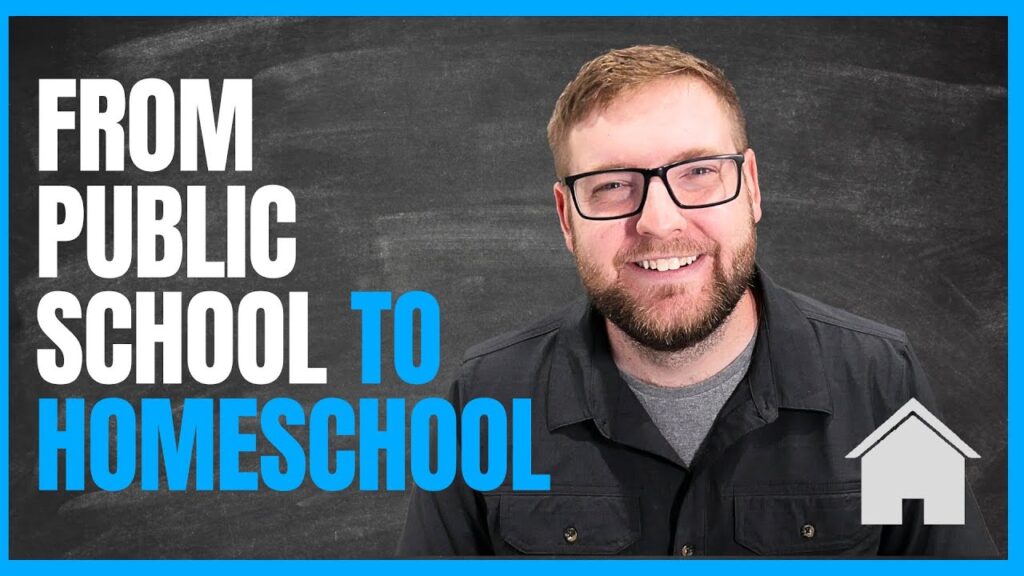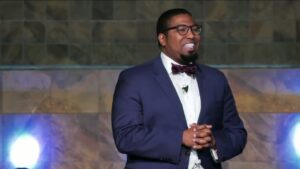‘Schools are failing according to their own standards,’ says former teacher-in-training turned homeschool advocate
Tim Lieber credits his high school band teacher with helping transform his life – precisely because she worked as much as possible outside the school system.
“She never followed any of the…

Tim Lieber credits his high school band teacher with helping transform his life – precisely because she worked as much as possible outside the school system.
“She never followed any of the typical rules. She was always a rule-breaker,” the Michigan dad says. “Looking back, that’s the thing that made her stick out the most.”
At one time Lieber had every intention of following in his teacher’s footsteps, even starting a Graduate Teacher Certification Program in 2019. But everything changed in 2021 when he decided to visit a homeschool co-op.
“I was just really blown away at how different the school was, especially going from the public-school setting to the co-op,” he said. “All the students were well, they respected themselves, they all seemed well-adjusted and happy, they were all dressed appropriately. I was like, ‘Whoa. What is this place?’”
The experience inspired him to drop out of the program in 2022 with only 12 weeks remaining for completion.
“There are many problems with our schools,” he writes in a recent blog post, “but going through the system and the university education program gave me an insider perspective on what is going wrong, and it’s way worse than you think.”
Prussian model failing modern-day students
As a homeschool advocate now, Lieber joins a growing number of public-school educators who have left their former careers to pursue alternative forms of education.
Part of the problem lies in the current system’s connections to the industrial era, Lieber said.
“It’s based on the Prussian model from the late 1800s,” he said. “And that is, to create factory workers who are obedient and can show up on time and can start working at their machine and sit there all day. … The other stuff – sort of like the business savvy and anything like that – really has to be learned outside the system.”
Lieber experienced this firsthand after getting his first degree in film and video production in 2015. He moved to Los Angeles but found he still needed to learn other skills to succeed in life. After his graduation, he touched base with one of his favorite professors who was head of his university’s film editing department.
“I feel as if you guys did a really good job teaching us what we need to know, but I feel like you didn’t do as good of a job teaching us how to make a living from it,” he recalled telling his professor.
“And then he said, ‘You sound like a Republican.’ That was his exact quote.”
Lieber, who was not a Republican at the time, remembers quickly changing the subject. But the conversation only fueled his disillusionment with the public education system.
“The standards and everything else that the schools set, they’re set by themselves. And so, as far as I’m concerned, the schools are failing according to their own standards. What does this really say about the whole system, in and of itself, if they can’t even live up to what they think that students should be able to do?”
‘A cultural issue’
Because of his experience in the teacher certification program, Lieber believes solutions to the current educational crisis lie outside the public system.
“No matter what happens, public education isn’t going to ever improve because it’s a cultural issue where we no longer appreciate the value in education anymore,” he said.
Parental involvement often drives a student’s success in school, which is why homeschooling works so well, Lieber said.
“With homeschool, you’ve got parents and students who are really involved in the quality and the care of their own education, whereas in the public school system, you’ve got it all compulsory. They have to be there, and they have to do this. And so, they see it as work rather than an opportunity to learn some really, really cool things.”
Teaching as a profession also has grown more politicized and intolerant of differing viewpoints, Lieber said.
“This new crop of teachers that they’re bringing in are completely ensconced in the world of DEI, just the more politicized stuff going on,” he said, recalling a professor in his teaching program who gave the class articles to read about veganism.
“I wrote in my response that this lifestyle might work for some people, but other people, they legitimately can’t even process non-meat food,” Lieber said. “And he emailed the whole class back, saying, well, you need to agree with me or else you’re going to get a bad grade.”
Lieber has created a YouTube channel where he explains homeschooling and shares his recent experience in the educational industry, warning parents and students what to expect.
“If you don’t fall right in line with this ideology, you’re going to get punished.
“The schools are not going to improve until they change the way they approach teaching. … If they look at the homeschool co-ops and what we’re doing, they can learn a lot.”
More efficient ways to ‘do school’
Lieber outlined three major areas that set homeschool co-ops apart from public schools: innovative teaching methods, administrative support and community.
“I feel like the homeschool community is so misunderstood, and the way that we do school is just so much more efficient,” he said.
For example, Lieber has found more freedom in teaching at the homeschool co-op than at public school, which focused on memorization rather than understanding.
“The students are just focused on copying the information down and trying to get it on paper so they can look at it later so they can memorize it right before their test or their quiz,” he said of public-school students.
“It was hard for me to get into a groove with my teaching because I always had to pause and wait for the students to finish writing whenever I was done with my point. … They were like, ‘This is what’s going to be on my quiz, and my quiz determines my grade.’“
In contrast, he found homeschool students asked questions, actively discussed the material they were learning and dove deep into subjects he wouldn’t have been able to address in a public-school setting.
“I gave them enough material there that they could really pick and choose from what their strengths were and what they were interested in,” he said of his assignments. “My focus was to teach. … They did all the other stuff on their own.”
Public-school students get told to sit quietly and do whatever teachers say to get a good grade, Lieber said. But homeschool students strive to be independent learners – a goal fitting his own teaching philosophy.
“My job here as your co-op teacher is not to tell you what to think or what things are like, but to try to teach you how to think and to look at different things from all of these perspectives.”
The technology Lieber uses at the co-op also surpasses what he found in the public schools. For example, he uses ProPresenter, a streaming and presentation software used by many churches to display videos, lyrics and other media seamlessly.
All of Lieber’s classes feature popular YouTube videos that resonate with his students.
“I’m never going to do as good of a job explaining something as a video that really, really smart people spent $35,000 on producing,” he said.
The software also allows Lieber to add timers for a five-minute break in the middle of his class.
“It’s going to be a lot easier for them to pay attention 45 minutes at a time, two times, rather than a whole hour and a half of just sitting there listening to me drone on and on,” he said.
When Lieber was still taking classes in the public school system, all the available presentation slides were dated from 2007 or earlier.
“They are just so dull,” he says. “The kids are not ever going to find this stuff engaging or interesting. As soon as engagement is taken away, that’s the end of it. You’ve lost them.”
The second area setting homeschool co-ops apart from public schools lies in administrative design and support. Unlike government-funded administrators, homeschool co-ops typically run through an all-volunteer board.
“They’re mostly all just sweet little homeschool moms, and none of them make a dime off of doing their position,” he said. “It’s all completely volunteer-based, and many of them work enough hours for it to be considered a full-time job.”
Such dedication does not compare to a public-school administrator making $150,000 a year or more, Lieber argues.
“These ladies are running this co-op because they love their students, and the students are involved in it. Compare that to a superintendent running a failing school. … Generally speaking, would you be willing to do that job for free because you love the kids?”
Homeschool administrators often explore learning opportunities in their local community – such as a retired Navy officer Lieber knows who has run an accounting firm for more than 30 years.
“He could walk up to the public high school that we have, knock on their office door, and they wouldn’t let him in, let alone let him teach a class. According to the state of Michigan, he isn’t qualified to teach a 15-year-old boy how to do taxes.”
In contrast, the homeschool co-op would welcome such a businessman anytime, Lieber said. “We would all be so happy because he was the answer to our prayers.”
Teachers also find more collaboration within a co-op setting because of its financial structure, Lieber explains. Instead of basing teachers’ pay on years of experience, his co-op pays teachers by the number of students attending their classes.
“We all want each other to succeed because we want more students to come to the co-op. My goal is to make my classes super fun, super valuable, and then open them up to where I can have lots and lots of kids sign up.”
Finally, co-ops do a better job than public schools in creating a sense of community and ownership among students and families, he says. For example, the co-op uses different rooms in a local church as classrooms. When children turn 10 years old, they must volunteer for either setup or tear-down crews each day.
“The students are the ones setting up the school in the morning,” Lieber says, adding their tasks including counting tables and chairs, vacuuming classrooms, and taking out the trash. “It really creates a sense of ownership, and it creates a sense of community and responsibility for these students.”
Contrast that approach to public schools, where students recently vandalized bathrooms just to record the scenes for TikTok, Lieber said.
“Our (public school) bathrooms got shut down all the time because these students were just going in and destroying them,” he said. “If you actually had to go in and clean all that up, do you really think it would happen that much?”
This year the Liebers’ oldest child is starting preschool at the homeschool co-op while Lieber continues his high school classes there.
He also hopes to continue growing his YouTube channel to raise awareness about homeschooling and the current educational system nationwide.
“I care so much about kids’ education and the education of all of the people in this country. If you love learning, you’re set so far apart from the typical American that it’s a superpower, essentially. And I want that for all my students.”



